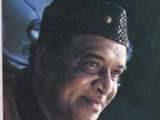Posted:
GUWAHATI/MUMBAI: His music carried the smell of the dark earth and the hum of the deep rivers he sang so passionately about. Bard and balladeer of the Brahmaputra, Bhupen Hazarika, 85, who passed away owing to multiple organ failure at Mumbai's Kokilaben Hospital on Saturday, was not only the greatest cultural icon of Assam but also the region's biggest cultural ambassador.
"He was not just a singer but a social reformer who brought the Northeast closer to the rest of India," film director and Hazarika's long-time companion Kalpana Lajmi told a news channel. National award-winning director Jahnu Barua said, "We have lost the Dronacharya of music. He was a creator whose quality compositions were easily identifiable and enjoyed by the common people."
A Dada Saheb Phalke winner, Hazarika's music echoed beyond borders. In a poll in Bangladeshfive years ago, his song, 'Manush Manusher jonno (Humans are for humanity)' was voted the second most-loved number after the country's national anthem, 'Amar Sonar Bangla'.
Singer, songwriter, composer, filmmaker - he was a complete artist. Hazarika composed for Bollywood films too without ever compromising either on his creative integrity or abandoning his roots in traditional Assamese folk. Yet he unfailingly found the popular pulse with tracks such as 'Dil hoom hoom kare' (Rudaali), 'Zara dheere zara dheeme' (Ek Pal) and 'Naino mein darpan hai' (Aarop).
"You paint through your songs. But I can't sing with my paintbrush. It's up to you to fill this lacuna in my artistry. That's why I have taken you," master painter MF Husain is said to have told Hazarika after asking him to provide the music for his film, 'Gajagamini'.
Two of Bhupen Hazarika's most widely-heard non-filmy tracks emerged in a variety of versions: 'Moi eti jajabor' (Assamese), 'Aami ek jajabor' (Bangla) and 'Aawara hoon' (written by Gulzar, Hindi) were the same song in different languages. Then there's 'Bistirno parore' - 'Ganga behti ho kyun' in Hindi - which was inspired by Afro-American singer Paul Robeson's classic, 'Ol' Man River'. For decades, the song was like an anthem for pro-Left activists.
Another music legend Manna De told a Bengali TV channel from Bengaluru said that he felt good whenever he sang under Hazarika's baton. "I used to tell him that there is a different feeling and sensation when I sang his songs at his direction. His talent spread from Assam all over India. His music enthralled everyone," the 92-year-old De said.
Born in Sadiya, a small town in northern Assam, 1926, Hazarika earned his masters fromBenaras Hindu University before receiving his doctorate in mass communication in the USA'sColumbia University. But his genius in music had surfaced much earlier: he sang his first song at the age of 10.
He went to Mumbai to work in the Indian People's Theatre Association(IPTA), a Left-wing cultural organization, with Salil Chowdhury, Balraj Sahni and others. "The generous city and its people have welcomed me, accepted me, and given me my second home. I admire its people for its willingness to allow people from the rest of India to earn a living and prosper, irrespective of caste, creed or colour," he once said.
Apart from writing and composing over 1,000 songs, he also produced and directed many Assamese films winning the President's national award thrice for 'Shakuntala' (1960), 'Pratidhwani' (1964) and 'Loti Ghoti' (1967). Few know that he also produced, directed and composed music for Arunachal Pradesh's first Hindi film in colour, 'Mera Dharam, Meri Ma'. Hazarika married Priyamvada Patel during his student days in Columbia University. The two were separated after 13 years. They had a son, Tej Bhupen Hazarika, who lives in the United States.
MUMBAI?GUWAHATI, 5 NOV: The country lost one of its music doyens today as singer-composer Bhupen Hazarika, who wove a magical tapestry out of traditional Assamese music and lyrics, died at a hospital here following a prolonged illness.
"It was a multi-organ failure. The end came around 4.30 p.m," Dr Jayanta Narayan Saha, in-charge of media relations at the Kokilaben Dhirubhai Ambani Hospital here, said. Doctors specified the organ dysfunction as pneumonia-led. "He was in the ICU for the past four months. His condition was fluctuating. For the last three or four days his health deteriorated and he became weak. He was on ventilator and dialysis," said Dr Ram Narain, CEO of the hospital.
The 86-year-old Dadasaheb Phalke Award winner was undergoing treatment at the hospital since 29 June, after he complained of breathlessness. Since then he was confined to the hospital bed. His long-time companion and filmmaker Kalpana Lajmi was beside him when he died.
Hazarika's death has left millions of his fans shocked. Leaders and well-wishers have condoled his death. President Pratibha Patil described him as "a creative genius whose deep baritone voice was instantly recognised by poetry and music lovers across the nation".
Prime Minister Mr Manmohan Singh said in Hazarika's "sad demise, India has lost one of its most gifted artists".
His native state Assam went into mourning with people gathering at his Guwahati residence and lighting lamps in their houses as a mark of respect.
It is not clear when his body will be flown back home. While Dr Saha said the body will remain in the hospital today and would be flown to Assam tomorrow, Hazarika's family said the mortal remains are likely to be brought to Guwahati on Monday.
Assam chief minister Mr Tarun Gogoi directed culture affairs minister Ms Pranati Phukan and senior officials to rush here for bringing back Hazarika's body to the state.
"He was not just a singer but a social reformer who brought the Northeast closer to the rest of India," film director and Hazarika's long-time companion Kalpana Lajmi told a news channel. National award-winning director Jahnu Barua said, "We have lost the Dronacharya of music. He was a creator whose quality compositions were easily identifiable and enjoyed by the common people."
A Dada Saheb Phalke winner, Hazarika's music echoed beyond borders. In a poll in Bangladeshfive years ago, his song, 'Manush Manusher jonno (Humans are for humanity)' was voted the second most-loved number after the country's national anthem, 'Amar Sonar Bangla'.
Singer, songwriter, composer, filmmaker - he was a complete artist. Hazarika composed for Bollywood films too without ever compromising either on his creative integrity or abandoning his roots in traditional Assamese folk. Yet he unfailingly found the popular pulse with tracks such as 'Dil hoom hoom kare' (Rudaali), 'Zara dheere zara dheeme' (Ek Pal) and 'Naino mein darpan hai' (Aarop).
"You paint through your songs. But I can't sing with my paintbrush. It's up to you to fill this lacuna in my artistry. That's why I have taken you," master painter MF Husain is said to have told Hazarika after asking him to provide the music for his film, 'Gajagamini'.
Two of Bhupen Hazarika's most widely-heard non-filmy tracks emerged in a variety of versions: 'Moi eti jajabor' (Assamese), 'Aami ek jajabor' (Bangla) and 'Aawara hoon' (written by Gulzar, Hindi) were the same song in different languages. Then there's 'Bistirno parore' - 'Ganga behti ho kyun' in Hindi - which was inspired by Afro-American singer Paul Robeson's classic, 'Ol' Man River'. For decades, the song was like an anthem for pro-Left activists.
Another music legend Manna De told a Bengali TV channel from Bengaluru said that he felt good whenever he sang under Hazarika's baton. "I used to tell him that there is a different feeling and sensation when I sang his songs at his direction. His talent spread from Assam all over India. His music enthralled everyone," the 92-year-old De said.
Born in Sadiya, a small town in northern Assam, 1926, Hazarika earned his masters fromBenaras Hindu University before receiving his doctorate in mass communication in the USA'sColumbia University. But his genius in music had surfaced much earlier: he sang his first song at the age of 10.
He went to Mumbai to work in the Indian People's Theatre Association(IPTA), a Left-wing cultural organization, with Salil Chowdhury, Balraj Sahni and others. "The generous city and its people have welcomed me, accepted me, and given me my second home. I admire its people for its willingness to allow people from the rest of India to earn a living and prosper, irrespective of caste, creed or colour," he once said.
Apart from writing and composing over 1,000 songs, he also produced and directed many Assamese films winning the President's national award thrice for 'Shakuntala' (1960), 'Pratidhwani' (1964) and 'Loti Ghoti' (1967). Few know that he also produced, directed and composed music for Arunachal Pradesh's first Hindi film in colour, 'Mera Dharam, Meri Ma'. Hazarika married Priyamvada Patel during his student days in Columbia University. The two were separated after 13 years. They had a son, Tej Bhupen Hazarika, who lives in the United States.
Music doyen Bhupen Hazarika passes away
5 November 2011
Press Trust of IndiaMUMBAI?GUWAHATI, 5 NOV: The country lost one of its music doyens today as singer-composer Bhupen Hazarika, who wove a magical tapestry out of traditional Assamese music and lyrics, died at a hospital here following a prolonged illness.
"It was a multi-organ failure. The end came around 4.30 p.m," Dr Jayanta Narayan Saha, in-charge of media relations at the Kokilaben Dhirubhai Ambani Hospital here, said. Doctors specified the organ dysfunction as pneumonia-led. "He was in the ICU for the past four months. His condition was fluctuating. For the last three or four days his health deteriorated and he became weak. He was on ventilator and dialysis," said Dr Ram Narain, CEO of the hospital.
The 86-year-old Dadasaheb Phalke Award winner was undergoing treatment at the hospital since 29 June, after he complained of breathlessness. Since then he was confined to the hospital bed. His long-time companion and filmmaker Kalpana Lajmi was beside him when he died.
Hazarika's death has left millions of his fans shocked. Leaders and well-wishers have condoled his death. President Pratibha Patil described him as "a creative genius whose deep baritone voice was instantly recognised by poetry and music lovers across the nation".
Prime Minister Mr Manmohan Singh said in Hazarika's "sad demise, India has lost one of its most gifted artists".
His native state Assam went into mourning with people gathering at his Guwahati residence and lighting lamps in their houses as a mark of respect.
It is not clear when his body will be flown back home. While Dr Saha said the body will remain in the hospital today and would be flown to Assam tomorrow, Hazarika's family said the mortal remains are likely to be brought to Guwahati on Monday.
Assam chief minister Mr Tarun Gogoi directed culture affairs minister Ms Pranati Phukan and senior officials to rush here for bringing back Hazarika's body to the state.



















comment:
p_commentcount